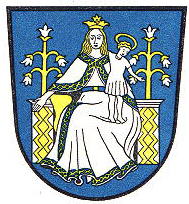Lilienthal: Difference between revisions
Jump to navigation
Jump to search
Knorrepoes (talk | contribs) m (Text replacement - "{{de}}" to "") |
Knorrepoes (talk | contribs) m (Text replacement - "{| class="wikitable"↵|+Official blazon↵|-↵|'''German'''↵| ↵|-↵|'''English''' ↵| {{blazon wanted}}↵|}" to "{| class="wikitable" |+Official blazon |- |'''German''' | blazon wanted |- |'''English''' | blazon wanted |}") |
||
| Line 13: | Line 13: | ||
|- | |- | ||
|'''German''' | |'''German''' | ||
| | | blazon wanted | ||
|- | |- | ||
|'''English''' | |'''English''' | ||
| | | blazon wanted | ||
|} | |} | ||
Revision as of 08:33, 6 April 2023
LILIENTHAL
State : Niedersachsen
District (Kreis) : Osterholz
Additions : 1974 Heidberg, Sankt Jürgen, Seebergen und Worphausen
| German | blazon wanted |
| English | blazon wanted |
Origin/meaning
The arms were granted in 1956 and were based on the old arms of the Amt Lilienthal. These in turn were based on the arms of the Cistercian monastery founded in 1232 by Gerard von der Lippe, Archbishop of Bremen. The St. Mary is the patron saint of the monastery, the lilies are canting as well as a symbol for the St. Mary.
Literature: Stadler, 1964-1971, 8 volumes.
